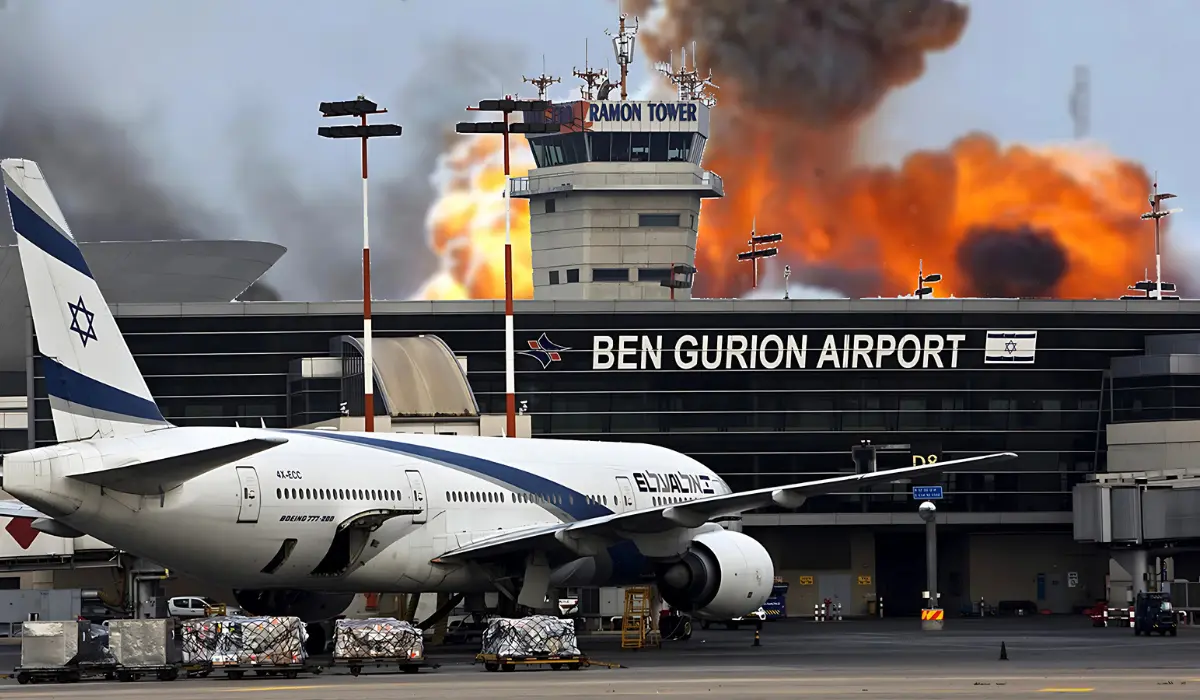✈️ What Happened on May 4, 2025?
In a major escalation in the Middle East conflict, a ballistic missile launched by Yemen’s Iran-backed Houthi rebels landed dangerously close to Ben Gurion International Airport — Israel’s busiest and most critical air hub. The impact occurred near Terminal 3, injuring at least eight people and sparking chaos among travelers. 🚨✈️
For nearly an hour, all flights and ground transport at the airport were temporarily suspended, causing delays and widespread concern. Authorities acted swiftly to secure the area and resume operations, but the psychological impact on the public and international airlines was undeniable. 😨
🎯 Why Did the Houthis Target Israel?
The Houthis claimed responsibility, stating it was a direct response to Israel’s renewed military activity in Gaza. This missile strike is part of a growing series of attacks launched from Yemen toward Israeli territory. The group even issued public warnings to international airlines, urging them to avoid Ben Gurion Airport due to “security threats.” 🛬💥
This bold and unprecedented attack has alarmed not just Israel but the entire international community, raising concerns about air travel safety and the Houthis’ growing missile capabilities. 🌍🔴
💣 Israel’s Reaction: Strong Words & Serious Questions
Following the attack, Israeli Defense Minister Israel Katz promised a firm and decisive response, making it clear that such aggression would not go unanswered. 🔁🔥
However, what’s more concerning is the Israeli military’s failure to intercept the missile, despite active defense systems being in place. The Iron Dome and other missile defense systems were reportedly engaged, but could not neutralize the threat. This has led to internal investigations and public scrutiny over Israel’s aerial defense preparedness. 🛡️❌
🌍 Broader Implications: A Regional Powder Keg
This incident represents more than just a single missile attack — it’s a sign of growing regional instability. With the Houthis showing increasing range and precision in their strikes, and Israel actively engaged in operations in Gaza, many fear the conflict could further spill across borders.
Countries across the region, as well as global travel authorities, are now watching closely as tensions continue to rise. The Ben Gurion incident might just be the beginning of a larger and more dangerous chapter in the Israel-Yemen conflict. 🧨🌐
🧠 What Should Travelers & Airlines Know?
- Stay updated with news from reliable sources like the Israeli Airports Authority and international travel advisories.
- Monitor flight statuses via official airline channels before heading to the airport.
- Exercise caution when planning layovers or direct flights into high-alert zones like Israel.
❓ FAQs
When did the missile hit Ben Gurion Airport?
The missile struck near the airport on May 4, 2025, close to Terminal 3, during peak operating hours.
Who launched the missile at Ben Gurion Airport?
Yemen’s Iran-backed Houthi rebels claimed responsibility, citing retaliation against Israeli actions in Gaza.
Were flights canceled at Ben Gurion after the missile strike?
Yes, flights were temporarily suspended for about an hour before airport operations resumed.
Why did Israel’s missile defense fail?
Despite attempts by Iron Dome and other systems, the missile wasn’t intercepted. The incident is under military investigation.
Is it safe to travel to Israel right now?
Travelers are advised to check real-time government advisories and news updates before planning trips to Israel.
Did the Houthis issue a warning before the attack?
Yes, the Houthis publicly warned international airlines of threats near Israeli airspace prior to the incident.
What is Terminal 3 at Ben Gurion Airport?
Terminal 3 is the main terminal at Ben Gurion Airport, handling most international flights and passenger traffic.
How has Israel responded to the missile attack?
Defense Minister Israel Katz vowed retaliation, and military analysts are reviewing the defense system’s performance.

